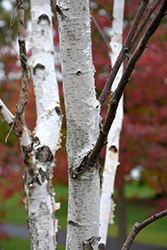It's all about ...
plants

White Satin Birch
Betula utilis 'White Satin'
Height: 35 feet
Spread: 20 feet
Sunlight:
![]()
![]()
Hardiness Zone: 5a
Other Names: Himalayan Birch, White Bark Birch
Description:
This birch is valued for its stunning white bark, with tan and pinkish colors peeling from mature trunks; good fall color; acidic soil best, susceptible to chlorosis in alkaline soils; resistance to birch borer has been reported
Ornamental Features
White Satin Birch is primarily valued in the landscape for its decidedly oval form. It has dark green deciduous foliage. The pointy leaves turn an outstanding yellow in the fall. The peeling white bark is extremely showy and adds significant winter interest.
Landscape Attributes
White Satin Birch is a deciduous tree with a shapely oval form. Its relatively fine texture sets it apart from other landscape plants with less refined foliage.
This is a relatively low maintenance tree, and should only be pruned in summer after the leaves have fully developed, as it may 'bleed' sap if pruned in late winter or early spring. It has no significant negative characteristics.
White Satin Birch is recommended for the following landscape applications;
- Accent
- Shade
Planting & Growing
White Satin Birch will grow to be about 35 feet tall at maturity, with a spread of 20 feet. It has a low canopy with a typical clearance of 3 feet from the ground, and should not be planted underneath power lines. It grows at a fast rate, and under ideal conditions can be expected to live for 70 years or more.
This tree does best in full sun to partial shade. It is quite adaptable, prefering to grow in average to wet conditions, and will even tolerate some standing water. It is not particular as to soil type or pH. It is highly tolerant of urban pollution and will even thrive in inner city environments. Consider applying a thick mulch around the root zone in winter to protect it in exposed locations or colder microclimates. This is a selected variety of a species not originally from North America.
This plant is not reliably hardy in our region, and certain restrictions may apply; contact the store for more information.
